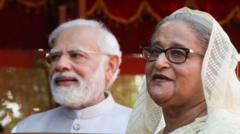Is Hasina's Conviction Straining India-Bangladesh Relations?

Published: 2025-11-20 01:00:30 | Category: world
India's long-standing relationship with Bangladesh's former Prime Minister Sheikh Hasina has been pivotal for both nations, emphasising stability and cooperation in the region. However, as Hasina faces a death sentence for crimes against humanity and India contemplates her extradition, the political landscape is fraught with tension. This situation poses significant diplomatic challenges for India as it navigates its ties with a key neighbour amid shifting allegiances and public sentiment.
Last updated: 30 October 2023 (BST)
What’s happening now
As Sheikh Hasina finds herself in India, having been sentenced to death in Bangladesh, the ramifications for India are complex and multifaceted. Her extradition is a matter of diplomatic concern, as Bangladesh seeks her return while India remains hesitant to comply. This situation not only tests India's commitment to its allies but also highlights the intricate balance of power and the shifting dynamics in South Asia.
Key takeaways
- Sheikh Hasina's extradition presents a diplomatic dilemma for India.
- Bangladesh is re-evaluating its foreign relations, leaning towards China and other nations.
- Public sentiment in Bangladesh has shifted against India, blaming it for supporting Hasina's regime.
Timeline: how we got here
The relationship between India and Bangladesh has evolved significantly over the years, leading to the current diplomatic quandary:
- 1971: India played a crucial role in Bangladesh's independence from Pakistan.
- 2009: Sheikh Hasina returns to power, strengthening ties with India.
- 2024: Hasina is sentenced to death for crimes against humanity amidst protests, leading to her seeking asylum in India.
- 2023: Bangladesh's interim government under Muhammad Yunus begins to shift foreign policy away from India.
What’s new vs what’s known
New today/this week
Recent developments indicate that Bangladesh is actively seeking Hasina's extradition while India remains reluctant to act on this demand. The interim government's diplomatic outreach has also intensified, suggesting a significant reorientation of Bangladesh's foreign policy.
What was already established
Historically, Hasina's leadership has fostered strong economic and cultural ties between India and Bangladesh. However, her increasing authoritarianism has led to growing discontent in Bangladesh, with many citizens now viewing India unfavourably.
Impact for the UK
Consumers and households
While the direct impact on UK consumers may be minimal, the shifting dynamics in South Asia could influence trade routes and economic stability in the region, which in turn could affect global markets.
Businesses and jobs
For UK businesses with interests in South Asia, the potential instability in Bangladesh could pose risks for investment and trade. Understanding the evolving relationship between India and Bangladesh will be crucial for strategic planning.
Policy and regulation
The UK government may need to monitor developments closely, especially as the situation could influence broader geopolitical strategies in South Asia, particularly concerning trade agreements and security partnerships.
Numbers that matter
- £10bn: The trade volume between India and Bangladesh, highlighting their economic interdependence.
- 4,096km: The length of the border shared between India and Bangladesh, crucial for regional security.
- 75%: The percentage of Bangladeshis who view ties with China positively, reflecting a shift in public sentiment.
Definitions and jargon buster
- Extradition: The process of handing over a suspected or convicted criminal to the jurisdiction of another state.
- Connectivity projects: Initiatives aimed at improving transportation and economic links between countries.
- High-maintenance guest: A diplomatic term referring to a leader or official whose presence requires significant resources and attention due to legal or security issues.
How to think about the next steps
Near term (0–4 weeks)
In the immediate future, India may seek to engage diplomatically with key stakeholders in Bangladesh to ease tensions while monitoring the political landscape closely.
Medium term (1–6 months)
As elections approach in Bangladesh, India will need to prepare for potential shifts in foreign policy and public sentiment, which could lead to re-evaluated diplomatic strategies.
Signals to watch
- Monitoring the political rhetoric from Bangladesh's interim government.
- Public opinion surveys in Bangladesh regarding India.
- Changes in trade agreements and partnerships between Bangladesh and other nations.
Practical guidance
Do
- Stay informed on developments in Bangladesh's political landscape.
- Engage with experts on South Asian geopolitics to understand implications for trade and security.
- Monitor public opinion trends in Bangladesh regarding India.
Don’t
- Ignore the potential consequences of Bangladesh's foreign policy shift.
- Assume that economic ties will remain strong despite political changes.
- Overlook the significance of public sentiment in shaping bilateral relations.
Checklist
- Review existing trade agreements with Bangladesh.
- Assess risks associated with investments in Bangladesh.
- Engage with diplomatic channels to gauge potential shifts in policy.
- Monitor human rights developments in Bangladesh and their implications.
Risks, caveats, and uncertainties
The situation remains fluid, with potential legal and political challenges surrounding Hasina's status in India. Furthermore, the evolving sentiment in Bangladesh poses risks for India as public opinion could further complicate diplomatic relations. The uncertainty of the upcoming elections adds another layer of complexity, as the new government may take a more adversarial stance towards India.
Bottom line
India's relationship with Bangladesh is at a crossroads, influenced by internal political dynamics and external pressures. The coming months will be critical in determining how both nations navigate these challenges and whether they can preserve a partnership that has long been beneficial for regional stability.
FAQs
What is the current status of Sheikh Hasina in India?
Sheikh Hasina is currently in India following her sentencing in Bangladesh, where she faces a death penalty for crimes against humanity. India has not indicated plans to extradite her.
How has public sentiment in Bangladesh shifted towards India?
Public sentiment in Bangladesh has turned increasingly negative towards India, with over 75% of the population viewing ties with China positively, compared to just 11% for India.
What are the implications of the upcoming elections in Bangladesh?
The upcoming elections in Bangladesh could significantly alter the diplomatic landscape, especially if the new government adopts a less friendly stance towards India.



